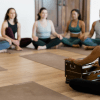
It’s true – becoming an effective and confident yoga teacher takes practice. While opportunities to teach āsana may currently be in short supply as a result of COVID-19, being a new yoga teachers is not dependent on having access to public spaces to teach. Discovering who you are and sharing that person with not only yoga students, but also the people you encounter throughout your life is at the heart of being a yoga teacher. It’s a process that has the potential to transform you and impact those around you in profound, and sometimes unexpected, ways.
Yoga is more than the āsana, and so are you
 By no means are the postures insignificant; Iyengar asserted that, for the average person, practicing āsana and prāṇāyāma are the two most effective disciplines for quieting the mind. But, in reality, the postures are only a piece of a much bigger process of self-discovery and transformation. Teaching āsana is not the only way to share yoga.
By no means are the postures insignificant; Iyengar asserted that, for the average person, practicing āsana and prāṇāyāma are the two most effective disciplines for quieting the mind. But, in reality, the postures are only a piece of a much bigger process of self-discovery and transformation. Teaching āsana is not the only way to share yoga.
I once supported someone through the death of a loved one. To help her manage the mound of tasks that surfaced in the wake of her loss, I would remind her to take breaks, to take deep breaths, and assess situations before acting. In essence, we practiced a little yoga every day. By helping her to hold the space between stimulus and response, she was able to control her thoughts enough to meet her responsibilities, while also honoring her grief.
Ask yourself these questions: Beyond the postures, how have I shared yoga with others? And, how can I continue to do so? Maybe it’s been through writing, conversation, or relationship, but if you’ve offered any of yoga’s gifts to another person, that’s teaching too.
Memberships expire, but knowledge doesn’t
Several years back, I moved from my home of four years. In the two years that followed, I taught yoga in studios sporadically, struggling to find my groove in new places. When it came time to renew my Yoga Alliance registration, I didn’t have many teaching hours to log. For a moment, I felt like I had lost my legitimacy as a teacher. Then I realized that, while memberships expire, knowledge doesn’t. My connection to yoga hadn’t gone anywhere, and that’s because I never stopped practicing.
During those tough two years, I maintained a very disciplined morning practice of worship and meditation. When I started teaching in studios again with regularity, I did so with ease and authenticity. Through a committed daily spiritual practice (sādhanā) and self-study through sacred texts (svādhyāya), my relationship to yoga shifted from a set of practices I performed to something that I lived.
 Being a yoga teacher means being a student first. If you don’t have many opportunities to teach or share yoga right now, weaving yogic practices and philosophies into your everyday life is essential to uncovering what you’re meant to offer as a teacher.
Being a yoga teacher means being a student first. If you don’t have many opportunities to teach or share yoga right now, weaving yogic practices and philosophies into your everyday life is essential to uncovering what you’re meant to offer as a teacher.
Keep your eyes on your own mat
In other words, don’t compare yourself to others, and commit to what feels right for you. If we’re focusing on what someone else is doing, we may stray from the work we’re meant to do. Krishṇa speaks to this in Bhagavad Gītā 3.35 when He explains that no one else can perform our dharma (spiritual purpose) for us, nor can we perform another’s. In fact, it’s dangerous to attempt to do so.
I run into this trap all the time. I’ll notice someone else’s work on social media, make a snap judgement, and then I’m full-steam ahead down one continuous, self-critical scroll. I eventually catch myself, realizing I’d been investing time in an idea of who I think I should be, rather than nurturing who I am. It happens, especially when the digital world tends to showcase large and enticing markers of success. Focusing on what it is we do well is really just another way to practice yoga.
If you recently completed a yoga teacher training, it’s both possible and important to continue your journey as a teacher right now, despite the plethora of unprecedented challenges we face today as yoga teachers, studio owners, and simply human beings. These perspectives are not meant to be magic-fixes, but rather things to practice. If there’s one thing that yoga reveals to us, it’s that we can show up imperfectly and make progress, even if we can’t immediately see the transformation taking place.




